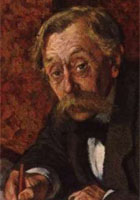Emile Verhaeren
Emile Verhaeren Poems
The hounds of despair, the hounds of the autumnal wind,
Gnaw with their howling the black echoes of evenings.
The darkness, immensely, gropes in the emptiness
For the moon, seen by the light of water.
...
A moon, with vacant, chilling eye, stares
At the winter, enthroned vast and white upon the hard ground;
The night is an entire and translucent azure;
The wind, a blade of sudden presence, stabs.
...
He who walks through the meadows of Champagne
At noon in Fall, when leaves like gold appear,
Sees it draw near
...
Cold in the earth—and the deep snow piled above thee,
Far, far removed, cold in the dreary grave!
Have I forgot, my only Love, to love thee,
...
Emile Verhaeren Biography
Emile Verhaeren was a Belgian poet, art critic and wrote short stories and verse plays. Biography He was born in a Flemish French-speaking, middle-class family in Sint-Amands. Nevertheless Emile Verhaeren also spoke the local dialect (Dutch was not taught at school at that time). At the age of eleven, he was sent to a strict boarding school in Ghent run by Jesuits - The Jesuit College of Sainte Barbe, where he became completely Frenchified. He then went to study law at the University of Leuven. Here he produced his first literary efforts in a student paper. During those years, he became acquainted with like-minded students. They later became his collaborators on the revolutionary artistic magazine "La Jeune Belgique". He studied law at the University of Louvain and while there started a journal, La Semaine, which was suppressed by the authorities as well as the following work Le Type. He was admitted to the bar at Brussels in 1881 but soon began devoting his time to literature, writing in French. He was soon one of the leading figures of the Belgian literary renaissance. Poetry He was one of the most prolific poets of his era. His first collection of poems "Les Flamandes" was published in 1883. Inspired by the paintings of Jacob Jordaens, David Teniers and Jan Steen, Verhaeren described in a direct and often provocative, naturalistic way his country and the Flemish people. It was an immediate success in avant-garde milieus, but caused a great deal of controversy in Catholic circles. His next book "Les Moines" (1886) was not the success he had hoped for. This, and his health problems, led to a deep crisis. In this period he published Les Soirs (1888), Les Débâcles (1888) and Les Flambeaux noirs (1891). On 24 August 1891 he married Marthe Massin, a talented artist from Liège. His new-found happiness found expression in three poetry books : Les Heures Claires (1896), Les Heures d’Après-midi (1905) and Les Heures du Soir (1911). In 1898 he moved to Saint-Cloud, near Paris. By the turn of the century, he had become world-famous. His works were translated into more than twenty languages. His German translator was Stefan Zweig He travelled, giving lectures, throughout Europe. The outbreak of World War I had a devastating effect on the poet's deep pacifist feelings. Death When Emile Verhaeren died on 27 November 1916 at Rouen station (by falling under a train), it was Théo van Rysselberghe and his friend, the famous French writer (and later Nobel Prize winner) André Gide who informed Marthe Verhaeren of the death of her husband. His vast body of work supports claims that he is one of the most prominent figures in Belgian literature. He narrowly missed the Nobel Prize for Literature in 1911 which was awarded to his friend, Maurice Maeterlinck. St. Amands, his native city, has dedicated a museum to this giant of Belgian literature, showing many original manuscripts of his works and letters along with works of his artistic friends Théo van Rysselberghe, Leon Spilliaert, Constantin Meunier, Paul Signac and Ossip Zadkine.)
The Best Poem Of Emile Verhaeren
Infinitely
The hounds of despair, the hounds of the autumnal wind,
Gnaw with their howling the black echoes of evenings.
The darkness, immensely, gropes in the emptiness
For the moon, seen by the light of water.
From point to point, over there, the distant lights,
And in the sky, above, dreadful voices
Coming and going from the infinity of the marshes and planes
To the infinity of the valleys and the woods.
And roadways that stretch out like sails
And pass each other, coming unfolded in the distance, soundlessly,
While lengthening beneath the stars,
Through the shadows and the terror of the night.

Excellent. Translated by? ? ? ?